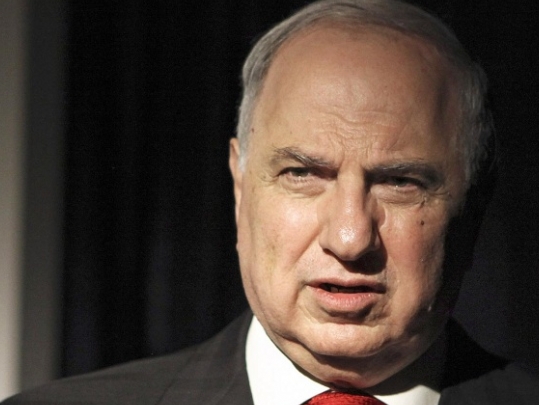Ahmed Chalabi: The Man Who Invited America to Invade Iraq

Ahmed Chalabi, who died of a heart attack in Baghdad on Tuesday aged 71, was one of the ablest, most maligned and misunderstood figures to play a central role in the overthrow of Saddam Hussein and the shaping of modern Iraq.
Chalabi was a man of the highest intelligence and mental agility, who attracted many friends and allies, but also many enemies. These were very diverse and ranged from Saddam Hussein to the CIA and the British Foreign Office, all of whom denounced him furiously.
A diplomat in Baghdad once told me: “I think that Chalabi is pure evil,” before going on to laud an Iraqi politician of notorious incompetence and corruption as the potential saviour of his country.
People always had strong opinions about Chalabi because he had a personality that nobody could ignore and because he was undoubtedly effective. He spent much of his life in a relentless campaign to overthrow Saddam Hussein and was uncaring about the methods he used to achieve these ends. He was ever the activist.
The accusation made against Chalabi after 2003 was that he had lured the US and its allies into a disastrous invasion of Iraq by fabricating or manipulating evidence that Saddam Hussein had weapons of mass destruction (WMD). In time, he became the scapegoat for politicians and journalists looking for somebody else to blame for their own failures and falsehoods.
The charge seemed to me to be absurd because it is the business of the political exile to pass on damaging information, true or false, about the government he or she is trying to overthrow. Only the laziest or most naïve of journalists should have imagined that information put their way by Chalabi – or any other Iraqi exile – was non-partisan.
The son of a wealthy Baghdad family, Chalabi fled Iraq as a teenager when the monarchy was overthrown. He earned a bachelor’s degree from the Massachusetts Institute of Technology in 1965, and then went on to get a PhD in mathematics at the University of Chicago.
I first met him in London in about 1992 when he had set up the Iraqi National Congress (INC) as an umbrella organisation for opposition to Saddam. The Iraqi leader had crushed the Shia and Kurdish uprisings in 1991 and it was evident to all his opponents that the only way to get rid of him was to get the Americans to invade Iraq. Chalabi’s objective was the same as that of the others, and he differed from them only in the care and hard work he put into achieving this end.
He moved to Washington, cultivated politicians and journalists and worked with American political lobbyists. He mingled with anybody who would listen, but particularly with Republicans. He helped pass the Iraqi Liberation Act in 1998, committing the US to replacing Iraq’s regime with a democracy, but it is worth keeping in mind that none of this would have led to the US invading Iraq if it had not been for 9/11.
I saw Chalabi many times during these years and always found his political judgement very clear, except in matters concerning his own political career. I remember him once saying to me about Iraq that “it is almost impossible to overthrow a government in power that is guarded by a violent, pro-active intelligence service”. This seemed strange since he had in fact been trying to do just that when based in Iraqi Kurdistan, plotting to start an insurgency against Saddam or foment a mutiny in the Iraqi army. I suspected that the aim of these machinations was to entangle the Americans once again in Iraq, but none these schemes worked.
The US-led invasion of 2003 was in a sense the high tide and the turn for Chalabi: he and the Americans had used each other, but had never trusted each other. He would say to me later that the big problem for the US was the same in 2003 as it had been in 1991, at the end of the Gulf war: if America got rid of Saddam Hussein’s regime, then its natural successor would be a Shia government (since the Shia make up 60 per cent of the Iraqi population) which would be close to Iran. The American solution to this problem was not only to invade Iraq but to occupy, and this was the origin of all subsequent calamities.
One reason so many American officials did not like Chalabi was that they did not control him and much preferred proxies whom they could order about. They were suspicious of his openly good relations with Iran, though in fact the US badly needed a conduit to Tehran. Chalabi’s abilities counted against him because his energy and intelligence frightened potential rivals who combined to exclude him from power.
The other charge brought against him was that he was corrupt. That accusation was always a bit rich coming from Iraqi politicians who had miraculously turned themselves into multimillionaires after a short time in office. The allegations usually revolved around the collapse of the Petra Bank in Jordan in the 1980s and Chalabi always denied wrongdoing, saying the bank had been targeted by other Jordanian banks and state officials.
Most of this time he stayed in Baghdad and, at one moment, was running a system of emergency committees. Once, I went with him to a bridge over the Tigris River that had been destroyed by a truck bomb and he was looking to see how it might be reconstructed. I was very conscious that the far side of the river at that time was in the hands of insurgents whose snipers could easily identify Chalabi. I lurked behind a broken pier of the bridge until he had finished his inspection.
His political vision remained clear to the end and early last year he told me that the Iraqi army would collapse as soon as it was attacked by the forerunners of Isis. I could not quite believe this but a few months later they captured Mosul and established the Islamic State.
- Source : Patrick Cockburn















